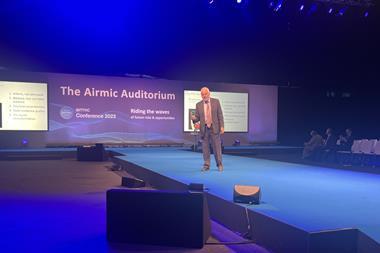Nick Chown talks to Lee Coppack about the start of his term as chairman of AIRMIC
What has your time as chairman of AIRMIC been like so far?
Nick Chown: Incredibly busy, because at the end of April I also started a new job as the first director of risk management for the Metropolitan Police. For three months I was commuting from Chesterfield, which was where my previous job with the Royal Mail was. I am now living in Market Harborough, which is within reasonable commuting distance of New Scotland Yard. I couldn't do it without the help of David Gamble and the AIRMIC secretariat and my team at the Met.
What ideas do you have for your year?
Nick Chown: My theme is setting a new standard. In the past, risk management has been associated with insurance in some quarters. It has developed to deal with insurable risks, even if they are not insured, but it is still insurance related. Many risk managers have made the jump to considering the whole spectrum of business risk. I think it is now logical for AIRMIC to do so too. My contention is that the real job of the corporate risk manager is to set minimum standards for all areas in which there are business risks. I want AIRMIC to be able to support its membership across the field.
What do you mean by business risk?
Nick Chown: I mean any element of risk that can prevent an organisation from achieving its objectives. It could be an insurable risk like fire, but it is much more likely to be something in the human resources area or a risk in information management, business continuity or reputation.
That is an ambitious approach. How can the risk manager get there?
Nick Chown: The risk manager must have access to the boardroom to operate effectively, and to do that we need wide skills and a thorough understanding of our own organisations. We have to be able to assist the organisation in all its risks if we are going to add value.
Does the reporting line influence perception of the risk manager's role? Isn't there going to be an insurance bias if he or she reports to the finance director?
Nick Chown: Not necessarily, but that does tend to send the message that risk is only about financial things, which is obviously not the case. I would prefer to work to a director with operational responsibilities, such as a director of strategic development.
How do you see AIRMIC's role developing?
Nick Chown: AIRMIC reflects the interests of its members, and a large number of them are involved in buying insurance and managing insurance risk, so these will remain a major part of AIRMIC's work. It also means that, where insurable risks are concerned, AIRMIC can leverage its very good network of contacts to lobby on behalf of its members.
But along with this core activity, AIRMIC must continue to develop support for the management of business risk. Publication of the Risk Management Standard in 2002 was an important step in that direction. We need to develop it further to provide a real framework for risk management and a series of tools that risk managers can apply in their own organisations to give guidance to their colleagues in other disciplines. I would also like to see AIRMIC involved in the development of other standards in cooperation with other organisations and supporting standards, too, where appropriate. The special interest groups (SIGs) are another important element in this. I would like to see us develop more of the business risk issues, such as business continuity planning, information management and outsourcing risks, for example. As in any association, the amount of work they can do depends on members having time available, so they tend to be driven by urgent problems like terrorism insurance or employer's liability. AIRMIC is not suddenly going to transform. It will always have a role in dealing with insurance and insurable risk issues. As I have said, that is core business. At the same time, we are expanding our role in the development of business risk management. I want to use my time as chairman in gaining the widest possible acceptance for the UK Risk Management Standard and in further establishing AIRMIC's credibility in the field of business risk through spin-off activity.Can you tell us about your new job?
Nick Chown: The Metropolitan Police created the job of director of risk management following recommendations of a report by Willis. I am the first person in this job, and my role is to develop risk management as a management capability and increase awareness and understanding of risk across the force. By its very nature, policing requires expertise in reactive risk management, and we are very good at that. My role is to further develop a proactive, strategic approach to handling risk. I have a team of 14 people. They are a mixture of police and civilian staff and, at the moment, all of them come from within the organisation. They come from different areas of the police service – training, quality management, business continuity planning, crisis management and so on. We are also going to bring in a couple of people from outside. The Met is a large organisation, with about 47,000 police and civilian employees. And we are expanding. The number of police officers will increase from 30,000 to 35,000 over a relatively short period. While this is a great opportunity to further improve service in support of our vision to make London the safest major city in the world, naturally there are risks arising from that sort of growth, which must be managed.



















